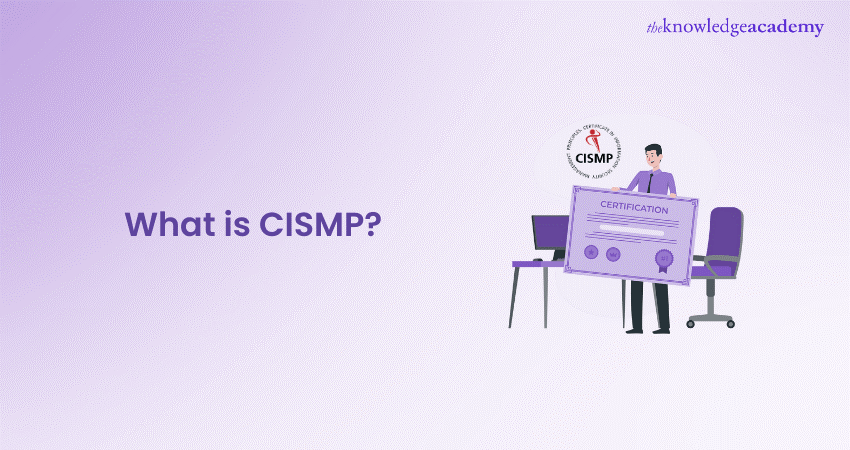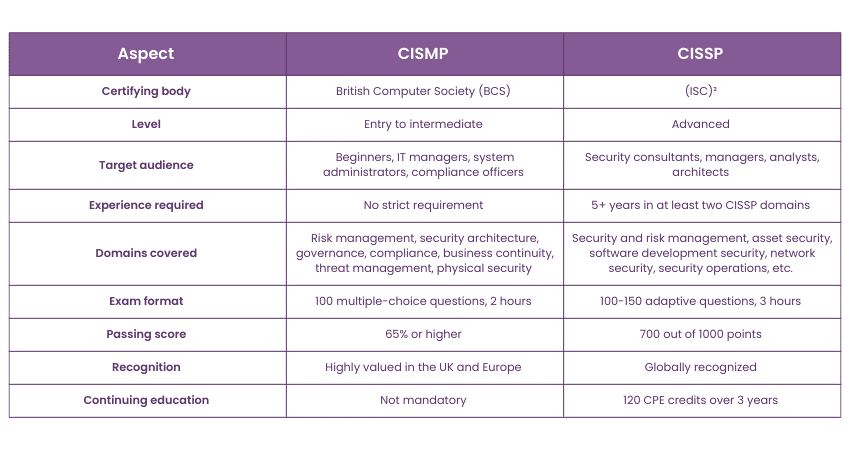We may not have the course you’re looking for. If you enquire or give us a call on +49 8000101090 and speak to our training experts, we may still be able to help with your training requirements.
Training Outcomes Within Your Budget!
We ensure quality, budget-alignment, and timely delivery by our expert instructors.

If you are a professional who wants to validate your knowledge of Information Security Management Systems (ISMS), you need to have CISMP certification. But What is CISMP?
CISMP is a globally recognised certification that showcases your fundamental knowledge in Information Security Management Systems (ISMS). Administered by the British Computer Society (BCS), it covers essential aspects of risk management, incident response, and security architecture and strongly emphasises their practical applications and effective practices. Read on to discover more about this impactful certification!
Table of Contents
1) What is CISMP?
2) Who is CISMP for?
3) CISMP requirements
4) Difference between CISMP and CISSP
5) Conclusion
What is CISMP?
The CISMP is considered an essential accreditation by the the British Computer Society (BCS). It is mainly for professionals who want foundational knowledge about cybersecurity. It deals with all aspects of information management, including risk management, security architecture, compliance standards, data governance, etc. These are all prerequisites for managing and protecting information systems.
This certification would have been excellent for cybersecurity newcomers and those whose primary interest was a broad understanding of security principles. Understanding the CISMP fundamentals helps a candidate gain experiential knowledge about establishing safe IT environments, responding to threats, and following best practices.
Who is CISMP for?
The CISMP is intended for people entering or shifting to cybersecurity and information systems management as a career. This would be pivotal for those who need a solid footing, such as IT managers, system administrators, and compliance officers who depend on such knowledge to safeguard organisational information.
Another aspect involves IT managers who oversee IT operations and lawyers who provide security advice and who gain knowledge of risk management, regulatory compliance, and security protocols. CISMP is also helpful for professionals in related careers, such as project management or auditing, who desire to view cybersecurity as a doctrine that helps them realise broader organisational security objectives.
Explore the key skills and certifications you need to excel as an Information Security Analyst!
CISMP requirements
The CISMP is an elementary short-term education course encompassing information security (InfoSec) management basics. There are no restricted admissions criteria, so it has an open-entry policy that should suit professionals from different fields.
A background in IT, security, and processes, as well as work experience or exposure to information security (InfoSec) notions, will be helpful but optional.
Discover whether CISMP is the right certification for boosting your career in cybersecurity!
How long does CISMP take?
Regarding CISMP Certification, someone with five years of experience would require between three months to one year to pass this certification, while there is substantial variability in individual preparation needs. Familiarity with the topics will significantly reduce the preparation time but require a lot of reading, which is understandable.
For example, once you get acquainted with most areas of knowledge, a week to a month could be the next step. The exam is six hours long, but the time necessary to get the certification depends on your daily study routine. An exam date can be predetermined up to several months in advance. Hence, it is essential to give yourself enough time for thorough preparation so that you pass it on the first attempt.
What's in the CISMP syllabus?
These are some topics included in the CISMP syllabus. These are:
a) Information Security Management Principles (10%)
b) Information Risk (Threats, Vulnerabilities) (10%)
c) Information Security Framework (Organisation, Implementation, Standards) (20%)
d) Procedural / People Security Controls (15%)
e) Technical Security Controls (including Infrastructure, Cloud Computing) (25%)
f) Software Development and Lifecycle (5%)
g) Physical and Environmental Security Controls (5%)
h) Disaster Recovery and Business Continuity Management (5%)
i) Other Technical Aspects
These modules contain the following topics that the professionals need to cover to earn this certification:
a) Module 1: Information Security (InfoSec) Principles
b) Module 2: Risk
c) Module 3: Information Security (InfoSec) Framework
d) Module 4: System Life Cycles
e) Module 5: Procedural and People Security Controls
f) Module 6: Technical Security Controls
g) Module 7: Physical and Environmental Security
h) Module 8: Disaster Recovery and Business Continuity Management
i) Module 9: Other technical aspects
Find out how CISM compares to CISMP and choose the best path for your career growth!
The CISMP exam
At the end of this accelerated course, you’ll sit the following exam to earn your certification degree:
CISMP Exam
a) Duration: 2 hours
b) Format: The evaluation will consist of 100 multiple-choice questions
c) Passing mark: 65% (65/100)
The BCS created the CISMP exam, which is conducted immediately or after a certain period from the completion of the course. If you succeed in the exam, you will be awarded the CISMP Certification recognised by BCS.
Do you want to learn how to develop and implement security policies and procedures? Then register now for our CISM Certified Information Security Manager Course!
Difference between CISMP and CISSP
The primary objective of both certifications is to ensure that security management is being implemented, and there are significant variances in the scope, depth of content, and target audience. Here's a detailed comparison:

Overview
The CISMP, operated by the British Computer Society (BCS), is considered to be an intermediary-level qualification in Information Security (InfoSec) Management. It provides general foothold principles to help professionals comprehend the area.
The syllabus covers topics such as risk management, architecture design, governance, compliance, and incident management. It provides a platform for those who are pioneering cybersecurity or are shifting from other IT roles.
On the other hand, CISSP is an advanced-level cybersecurity certificate with global authority targeted at security practitioners with years of experience. It is a comprehensive analysis of information affecting several domains, covering asset security, software development security, network security, and security governance. The CISSP is for professionals with at least five years of experience and is a requirement for posts leading to security management positions.
Prepare Like a Pro: Explore Must-Know Interview Questions for Information Security Analysts
2) Primary audience
CISMP is intended for people who are just beginners in cybersecurity or are associated with IT or managerial departments. The security concepts of CISMP provide value to the practitioners in project management, IT management, compliance officers, and system administrators.
On the other hand, the CISSP is a foundation for aspiring information security (InfoSec) professionals. It is recommended for people in security consultant, analyst, architect, auditor, and network security manager positions. It is helpful to those who want to take up more demanding occupations with advanced cybersecurity positions.
3) Scope and domains covered
CISMP 's syllabus offers a broad overview of Cybersecurity principles across critical domains. These domains are:
a) Risk Management and Incident Response
b) Governance and Compliance
c) Security Architecture and Controls
d) Business Continuity and Disaster Recovery
e) Threat and Vulnerability Management
f) Physical Security
g) Information Security Frameworks (ISO/IEC 27001, NIST, etc.)
On the contrary, the CISSP curriculum is more comprehensive, encompassing eight primary domains. These domains are:
a) Security and Risk Management
b) Asset Security
c) Security Engineering
d) Communications and Network Security
e) Identity and Access Management
f) Security Assessment and Testing
g) Security Operations
h) Software Development Security
Uncover the differences between CISSP and CISMP to make an informed certification decision!
4) Exam structure and difficulty
The CISM exam consists of 100 multiple-choice questions (MCQs) across the syllabus, requiring candidates to answer at least 65% correctly within two hours to pass. Diligent preparation makes the exam manageable, particularly for individuals already familiar with IT or cybersecurity concepts.
On the contrary, the CISSP exam is computer-based and adaptive, meaning the difficulty adjusts based on previous responses. It includes 100-150 questions, of which around 25 are non-scored pre-test items. Candidates are given three hours to complete it and should score at least 700 out of 1000 points to pass. Due to its depth and breadth, it is considerably more challenging than the CISMP exam, demanding thorough preparation and real-world experience.
5) Recognition and value
CISMP is generally respected in the UK and Europe as an essential professional qualification, drawing a straight line into the information security (InfoSec) occupation. The growth of upskilling or reskilling programs themselves seems to be a beneficial part of a constantly evolving environment of corporate workplaces in fields such as IT, governance, or risk management roles.
On the other hand, the CISSP is a globally recognised and widely respected designation, and it is also regarded as the most sought-after choice in cybersecurity managerial certifications. It shows that the individual has a deep sense of confidentiality at an organisational level, which provides them with good career opportunities.
Curious about Information Security Analyst salaries? Get insights into the earning potential in this field!
6) Continuing professional development
CISMP updates its education about industry trends, and no continuous professional education (CPE) requirement is imposed as a basis for maintaining CISMP certificates.
On the contrary, CISSP demands certified practitioners to obtain 120 CPE credits within three years to hold their credentials. This way, we ensure the process is continuous, and the team is always up to date with the fast-growing cybersecurity environment.
Are you interested in learning how to protect data and systems in an increasingly digital world? Register now for our CISMP Training!
Conclusion
We hope that from this blog you understood What is CISMP, and how it provides a solid foundation for anyone interested in information security (InfoSec). It verifies skills in essential cybersecurity principles and enables professionals to apply security management concepts effectively within their organisations.
Learn how you can Develop skills in identifying, assessing, and managing information security risks with our BCS CISMP (Certificate in Information Security Management Principles) Course!
Frequently Asked Questions

The standards for CISMP follow international information security (InfoSec) standards, covering ISO/IEC 27001, NIST, and GDPR principles.

The CISMP exam requires a broad understanding of these topics, but with diligent preparation, passing is attainable even for newcomers.

The Knowledge Academy takes global learning to new heights, offering over 30,000 online courses across 490+ locations in 220 countries. This expansive reach ensures accessibility and convenience for learners worldwide.
Alongside our diverse Online Course Catalogue, encompassing 17 major categories, we go the extra mile by providing a plethora of free educational Online Resources like News updates, Blogs, videos, webinars, and interview questions. Tailoring learning experiences further, professionals can maximise value with customisable Course Bundles of TKA.

The Knowledge Academy’s Knowledge Pass, a prepaid voucher, adds another layer of flexibility, allowing course bookings over a 12-month period. Join us on a journey where education knows no bounds.

The Knowledge Academy offers various CISM Training, including the CISM Certified Information Security Manager Course. These courses cater to different skill levels, providing comprehensive insights into the Worth of CISMP.
Our IT Security & Data Protection Blogs cover a range of topics related to CISMP, offering valuable resources, best practices, and industry insights. Whether you are a beginner or looking to advance your Security Management skills, The Knowledge Academy's diverse courses and informative blogs have got you covered.
Upcoming IT Security & Data Protection Resources Batches & Dates
Date
 CISM Certified Information Security Manager
CISM Certified Information Security Manager
Mon 6th Jan 2025
Mon 3rd Mar 2025
Mon 2nd Jun 2025
Mon 7th Jul 2025
Mon 6th Oct 2025
Mon 1st Dec 2025







 Top Rated Course
Top Rated Course



 If you wish to make any changes to your course, please
If you wish to make any changes to your course, please


